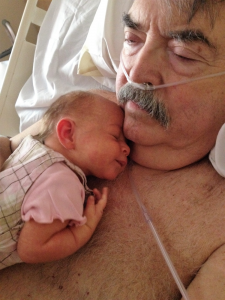Tim Swedlund

On July 26, 2013, my husband awoke at 3 am with severe abdominal pain. He was looking forward to a fishing trip that day so he ‘treated’ the pain with the usual antacids and Tylenol and tried to go back to sleep. At 5:30 am we were on our way to the ER and he was in agony. I suspected a bowel obstruction from his symptoms
At the ER we were brought back to a room and the usual IV and bloods were drawn and a flat plate abdominal x-ray verified the obstruction with a CT scan to follow. We were made aware of the diagnosis and told that the surgeon, on call, would be in to see us.
8 hours later, it was evident that my husband’s condition had deteriorated rapidly and he was finally placed in a med/surg room. The surgeon came in and told my husband that his surgery was scheduled for first thing in the morning. I pleaded with her that I felt the surgery needed to be done immediately and told her of Tim’s symptoms and my fear of sepsis. My husband sided with the surgeon and his scheduled surgery was left until the next morning.
4:30 am, the next morning, my phone rang and my husband told me in a very weakened voice that they were taking him to surgery and I should come up to the hospital. On arrival I was ushered back to the pre-op area where the anesthesiologist and the surgeon were trying to get an NG tube into his stomach. Not an easy task. I quickly asked for nasal topical Lidocaine and could see the problem; my husband’s stomach was so extended that it was pushing against his esophogeal sphincter. I asked the attendants to raise the head of his bed and he immediately began to vomit copious amounts foul smelling liquid. The tube was then inserted and he was taken to surgery.
Tim did well in the surgery and his surgeon told me that they had to resect a foot of his bowel. The cause was a mesh that had been implanted six years earlier that had attached to his bowel. I stayed with Tim until midnight that night and he convinced me to go home. I knew not to leave! However, I had been awake for nearly 24 hours and I craved a shower and a nap. Four hours later he called me, “I’m in trouble!” he said. “I need you to come back.” There was an odd sound to his voice but I didn’t question his concerns and I flew back to the hospital.
Entering his room, every light in his room was on. I could see his IV had slipped from his arm and was dripping on the floor; his bed was soaked with blood from an open vein. His urinary bag was empty but there was no Intake or Output charted on the flow sheet. My husband’s heart rate was a steady 140. His temp was 103 and the new nurse that walked in greeted me with a smile. “He’s doing fine!” she said brightly.
I held my tongue and asked calmly, “Would you please take his blood pressure?” She put a small cuff around his wrist. “No”, I said. “Please get a cuff that fits my husbands upper arm and take the blood pressure.” I could tell that she was feeling irritated but she didn’t say anything other than his blood pressure has been normal all night. When she returned and took his blood pressure, correctly he was 90 over 60.
“When the doctor comes in I’ll let her know that his blood pressure is a little low,” she said.
“Wait!” I exclaimed. “What do you see here?” I said waiving my hand toward the room.
The nurse became flustered. “I don’t know! This all looks fine for a post-op patient”
I walked to his monitor. “His heart rate is 140! I lifted his urine bag for her to see. “His urine bag is empty. Did you empty it any time during your shift?”
She shook her head no with real confusion on her face.
“His IV has been pulled from his arm. When was the last time you checked his IV?”
“At shift change. I only have to check it twice a shift. Once when I come in and once when I go off,” she said defiantly.
“He has a fever of 103!” What do all of these symptoms tell you?”
“He is a normal post-op patient experiencing pain.”
I wanted to scream and yell and slap that young nurse but instead I picked up the phone and called a Rapid Response.
The young nurse told me that I couldn’t do that and she was going to report me to her supervisor. The first person who came running into the room was the ICU intensivist. He listened to me intently and I gave him a brief report of his symptoms and my concern of sepsis.
Within 20 minutes my husband had been diagnosed with sepsis, bi-lateral pneumonia, and multi-organ failure. His sepsis was gangrene and he was also diagnosed with an abdominal compartment syndrome. His survival rate was 14%.
For the next 60 days I never left his side. I stopped a total of 15 medical errors before they reached my husband and one error that I was not able to prevent that caused my husband to have to return to surgery to stop abdominal bleeding. On week three he was transferred to a rehab center. There, I taught nurses how to change a bed without hurting the patient; how to change a wound vac without introducing new bacteria, and became known as the “Guard Dog”. Nothing went into my husband’s arm without my knowledge of what it was. He was there for 28 days and for 28 days I asked his physician to please draw bloods and confirm whether or not Tim was in heart failure. For 28 days he blew me off as a “type of nurse that just knows everything!”
The day my husband entered the hospital he was ready to go fishing with his brothers. We walked three miles day and he was still working full-time in the career he had had our entire marriage. When I brought him home from rehab he could barely walk, was incontinent of urine and stool, had no perception of time. He still looked shocky! I took his vitals every 4 hours and his heart rate was still in the 120s His weakness was so profound that we brought in a home health nurse rather than having him go to his doctor. His chance of survival over the next year was 50/50.
I started his physical therapy at home as well as cognitive exercises and learned how to live with a husband newly diagnosed diabetes. I was also learning how to cope with his wounds with daily care and a wound vac. I knew that his wound was worsening and I did not have the expertise, nor did his home health nurse, to effectively treat him and managed to get him back to the hospital. In addition, to the wounds I had a suspicion that he was still in heart failure. The minute the doctor examined him he put him back into the hospital to treat heart failure.
We celebrated his one and two year anniversary of survival. This year will be his fourth. He is independent, drives a car, has been fishing twice with his brothers and, unfortunately, has had to retire. He has peripheral neuropathy, easily fatigues but pushes through it, and travels with me as I take interim jobs as a Quality Consultant to make up for the income that was lost due to my husband’s illness. He has chronic back pain due to being dropped from a sling in a radiology department. It cannot be surgically repaired because he is such a high risk patient.
One night in ICU my husband began talking to Jesus and his mother and father. His parents have passed but he swore they were standing beside me as was Jesus. Tim kept pulling on my hand and insisted that I go with him. When he opened his eyes tears streamed down his face. “Honey, Jesus says I have to stay here with you.” It’s the only explanation I have for the reason he will celebrate his 70th birthday. Thank you, Jesus, for the years you added to our lives together.
Source: Kate Swedlund (Tim's wife)


























